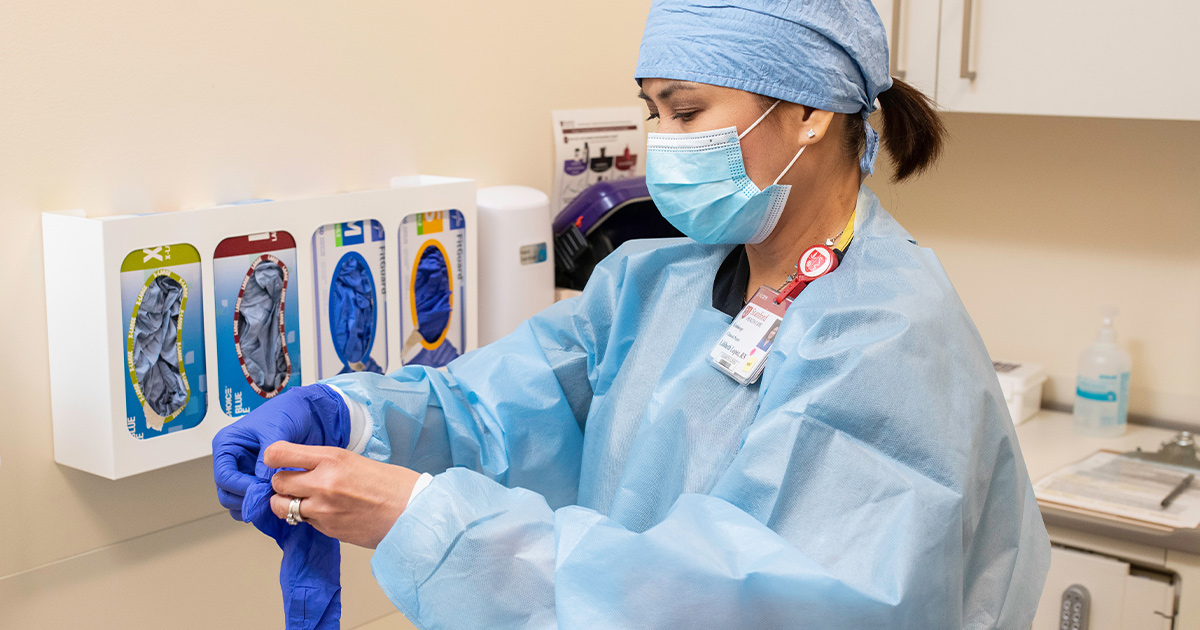Cancer Care
Part of Tri-Valley

Leaders in Cancer Treatment
Stanford Health Care – Tri-Valley delivers advanced cancer diagnosis and treatment, close to home. Cancer doctors, including breast and gynecologic cancer specialists, offer the latest therapies, including targeted radiation therapy, robotic surgery, and clinical trials. Our progressive cancer program has held American College of Surgeons’ Commission on Cancer Accreditation since 1992.
What We Offer You for Cancer Care
- Personalized care for those cancers of the bladder, breast, colon, endocrine system, esophagus, kidney, lung, ovaries, prostate, uterus, and more. Go to Complete Care & Support
- Advanced treatment options including cellular and immunotherapies. Go to Treatments
- Team approach with highly experienced specialists working together closely to coordinate a care plan customized to your physical, emotional, and spiritual needs. Go to Your Care Team
- Comprehensive support services to help you and your family focus on health and healing. Go to Support Services
- Easy access to care and participation with most major insurers. Go to Accessing Care
At Stanford Health Care – Tri-Valley, you can access sophisticated cancer diagnosis and treatment in one convenient location. Doctors in different medical specialties diagnose cancer and recommend treatment. For cancer affecting the gastrointestinal system, lungs, or blood and immune systems, you might work with a specialist in those areas. Our oncology specialists focus on breast and gynecologic cancer. Through our collaboration with the Stanford Health Care network, we offer access to the most advanced medical expertise and innovations for any type of cancer.
Stanford Health Care – Tri-Valley’s board-certified breast cancer specialists, medical oncologists, cancer surgeons, and gynecologic oncologists diagnose and treat conditions including:
Minimally invasive robotic surgery and targeted radiotherapy provide precise treatment with fewer side effects.
Breast Cancer
Breast cancer is the second most common cancer in women. Our Breast Center is fully accredited by the National Accreditation Program for Breast Centers, which means you can trust our quality of care. We evaluate suspected breast cancer and treat all types, including:
- Early-stage invasive breast cancer
- Advanced or metastatic invasive breast cancer (breast cancer that spreads to other parts of the body)
- Noninvasive (in situ) breast cancer
- Recurrent or treatment-refractory breast cancer (breast cancer that resists treatment)
- Hereditary breast cancer and high-risk counseling
- Inflammatory breast cancer
- Breast cancer during pregnancy
- Breast cancer in young women
- Male breast cancer
Gynecologic Cancer
Gynecologic cancer includes cancers that affect the female reproductive organs. We provide compassionate, patient-centered cancer treatment, surgery, and post-operative care for conditions including:
- Cervical cancer
- Gestational trophoblastic disease
- Ovarian, fallopian tube, and peritoneal cancer
- Uterine cancer
- Vaginal cancer
- Vulvar cancer
Gastrointestinal (GI) Cancer
- Anal cancer
- Cholangiocarcinoma (bile duct)
- Colon cancer (colorectal cancer)
- Esophageal cancer
- Gallbladder cancer
- Liver cancer
- Pancreatic cancer
- Stomach cancer
Endocrine Tumors
- Adrenal cancer
- Neuroendocrine tumors
Urologic Cancer
- Bladder cancer
- Kidney cancer
Other Cancers
- Lung cancer
- Prostate cancer
- Testicular cancer
- Sarcoma
- Skin cancer
Stanford Health Care – Tri-Valley delivers care in a modern yet soothing and friendly environment where healing and caring are top priorities. Our team includes board-certified breast cancer specialists, medical oncologists, cancer surgeons, and gynecologic oncologists. While one doctor coordinates your care, you also have an expert team to guide you through your personalized treatment and follow-up.
INNOVATION HIGHLIGHTS
Stanford Health Care - Tri-Valley's cancer program has been accredited by the American College of Surgeons' Commission on Cancer since 1992. Tri-Valley is among a select group of hospitals that have met strict clinical, education and cancer reporting requirements. Only 20 to 25 percent of the nation's 6,000 hospitals have earned this recognized accreditation. This achievement is a benchmark of quality for cancer care, and Tri-Valley was granted a three-year approval. Stanford Health Care - Tri-Valley has devoted considerable resources to developing and maintaining a progressive cancer care program.
All Treatments
To help ease a patient's anxiety, services are offered in a modern yet soothing and friendly environment where healing and caring are top priorities. While one physician coordinates care, patients have the benefit of an expert team of oncology professionals working together to guide them (and their families) through treatment and follow-up. Treatment is specialized depending upon each patient's individual needs.
Women’s Imaging
Designed and staffed by women, the spa-like Breast Imaging Center offers the latest technology in mammography and ultrasound, including:
- 3D mammography and digital mammography
- Stereotactic breast biopsy
- Image-guided breast biopsy
Breast Cancer Surgery
Our breast cancer surgeons offer the latest approaches to breast cancer surgery. We perform nipple-sparing techniques, partial mastectomy, and breast reconstruction. When possible, we choose minimally invasive approaches for a smoother recovery and fewer surgeries. We offer:
- Breast-conserving surgery (lumpectomy)
- Laser surgery and laser therapy
- Mastectomy, including nipple-sparing mastectomy
- Oncoplastic surgery
Gynecology Surgery
Gynecologic oncologists are expert surgeons trained to use advanced technology to perform minimally invasive procedures in the complex and sensitive tissues of a woman's reproductive system. Surgery removes a tumor and the tissue around it. It is highly effective for gynecologic cancer. Gynecologic surgery for cancer includes:
- D&C (dilation and curettage)
- Hysterectomy
- Laser surgery and laser therapy
- Salpingo-oophorectomy, or surgically removing the fallopian tubes and ovaries
Radiation Therapy
Radiation therapy (also called radiotherapy) uses beams of energy or small amounts of radioactive material to destroy cancer cells and slow tumor growth. Your doctor may recommend radiation after or along with medical therapy or surgery. Types of radiation therapy include:
- 3D conformal radiation therapy
- Accelerated partial breast irradiation (APBI)
- External beam therapy
- Intensity-modulated radiotherapy (IMRT)
Medical Therapy
Medical therapy delivers medications throughout your body (systemic therapy) to target cancer cells. You may receive treatment as a pill, through infusion (intravenously), or by injection. Medical therapies include:
- Chemotherapy
- Hormone therapy
- Targeted therapy
Survivorship
After cancer treatment, you’ll receive a survivorship care plan. Whether you’re newly diagnosed with cancer or long finished with treatment, we work to help you live a healthier life for the long term. Our program helps minimizes side effects from treatment so you can feel well both physically and emotionally.
Your Cancer Care Team
At Stanford Health Care – Tri-Valley, we use an multidisciplinary approach to treat cancer. Health care providers from different specialties collaborate to create your individualized care plan. Your care may include medical oncology, radiation, and surgery. After treatment, reconstruction specialists and our rehabilitation team support your recovery and survivorship.

Your Doctors
Medical Oncologists
Medical oncologists have specialized training in diagnosing and treating cancer using medications, including chemotherapy and biological, hormonal, and targeted therapy.
View All Medical OncologistsRadiation Oncologists
Radiation oncologists have subspecialty training in using high-energy radiation to destroy cancer or prevent its spread while protecting healthy tissue.
View All Radiation OncologistsCancer Surgeons (Surgical Oncologists)
These surgeons specialize in treating cancer through traditional (open) and minimally invasive surgery. Surgical oncologists perform biopsies (taking tiny tissue samples) to test for cancer. They also surgically remove tumors, some surrounding tissue, and lymph nodes to evaluate them for the presence of cancer.
View All Cancer Surgeons (Surgical Oncologists)Gynecologic Oncologists
Gynecologic oncologists are gynecologists with advanced training in the treatment of women with cancer of the reproductive organs. They will be the first doctor you see, and they will oversee all aspects of your care, from diagnosis to treatment to follow-up care. They provide medical and surgical treatments, and administer chemotherapy.
View All Gynecologic OncologistsBreast Reconstructive Surgeons
Breast reconstruction surgeons have specialty training in rebuilding and reshaping breasts after breast cancer surgery to remove tumors. Many breast reconstruction surgeons are plastic surgeons and use synthetic implants or tissue from elsewhere in your body to reconstruct your breast.
View All Breast Reconstructive SurgeonsRadiologists
A radiologist who specializes in cancer has additional training in imaging technologies, including X-ray, ultrasound, CT, and MRI, to detect and diagnose cancer. These doctors interpret imaging results and take biopsies, as needed, to help confirm a diagnosis.
View All RadiologistsPathologists
These doctors have special training in detecting and diagnosing cancer by examining tissue samples, taken during a biopsy, under a microscope. Pathologists work closely with oncologists to determine the type and stage of cancer.
View All PathologistsAdditional Team Specialists
Diagnostic Radiologists
Diagnostic radiologists are experts in interpreting medical images. Using X-rays, computed tomography, ultrasound, and magnetic resonance imaging, these specialists view internal organs, structures, and tumors. They can diagnose cancer and assess whether treatment is reducing tumors.
View All Diagnostic RadiologistsInterventional Radiologists
Interventional radiologists use minimally invasive techniques, along with real-time imaging technology, to treat you. For example, they can deliver chemotherapy directly into a tumor using a catheter and a small incision.
View All Interventional RadiologistsUrologists
Urologists assist gynecologic oncologists with surgeries on your urogenital tract or urologic organs, such as the bladder, if treatment leads to a condition like a pelvic floor disorder.
View All UrologistsReconstructive and Plastic Surgeons
Women with gynecologic cancer often face changes in body function or physical appearance. Reconstructive and plastic surgeons reconstruct pelvic organs after cancer treatment, when needed.
View All Reconstructive and Plastic SurgeonsPalliative Care Doctors
If you are facing advanced-stage cancer, our palliative care doctors can assist you with your physical and emotional needs. In our program, all patients who are newly diagnosed meet with a palliative care doctor who is instrumental in managing pain, reducing suffering, and improving your quality of life.
View All Palliative Care DoctorsReproductive Endocrinologists
Also called onco-fertility specialists, these doctors can help if your cancer treatments make it difficult for you to become pregnant. Reproductive endocrinologists provide expert assistance for ovarian preservation, egg preservation, or freezing ovarian tissue for future fertility.
View All Reproductive Endocrinologists
Extended Care Team
Breast Cancer Patient Navigators
Breast cancer patient navigators answer your questions, from mammogram screening through follow-up tests and diagnosis. Navigators can explain the diagnosis, educate you and your family about the condition, and discuss various treatments, and help with scheduling appointments during treatment. Contact the Stanford Health Care – Tri-Valley Breast Cancer Patient Navigator at 925-580-1310.
Oncology-Certified Nurses
Oncology-certified nurses are registered nurses with additional experience and education in caring for people undergoing cancer treatment. These specialized professionals manage your day-to-day care, including surgical recovery and medication treatment, as part of your cancer care team.
Genetic Counselors
Counselors in our Cancer Genetics Program have special training to advise you and your family on identifying and managing any risk of inherited breast or gynecologic cancer. They work with you and your doctors to coordinate genetic testing and help you understand the results.
Research Coordinators
If you qualify for a clinical trial, our research coordinators guide you through the process. They educate you about what to expect during the study, answer your questions, and schedule your appointments.

Support Services
We help with the details so you can focus on your health and wellness. We offer a range of patient services and helpful information to coordinate the various aspects of your care:
We help with the details so you can focus on your health and wellness. We offer a range of patient services and helpful information to coordinate the various aspects of your care:
We support you with a wide range of resources throughout cancer diagnosis, treatment, and survivorship. We also offer:
• Wig Services (at Stanford Health Care – Tri-Valley Resource Center)
• Lymphedema therapy
• Nutrition education and counseling
• Outpatient pharmacy and medication counseling
• Rehabilitation services
• Women in Need Fund for uninsured and underinsured patients in the Tri-Valley communities of Livermore, Pleasanton, and Dublin
• HERS Breast Cancer Foundation (post-surgical resources)
Additional Resources
American Cancer Society
The American Cancer Society can be your starting point for overall information on types of cancer and treatment, helpful information for patients and families, and management of your cancer experience. You will also find support programs, services, and resources for lowering your cancer risk. On the Cancer Survivors Network, patients can share their stories and connect with others for support.
National Cancer Institute
The National Cancer Institute (NCI) has a comprehensive site from the National Institutes of Health offering extensive explanations and treatment information about all types of cancer. The NCI also works to increase awareness and use of palliative care to promote quality of life for people with cancer. Palliative care offers support and comfort to patients and their loved ones from diagnosis through recovery or during recurrence, advanced disease, and the end of life.
Cancer.Net
Cancer.Net is the consumer information site from the American Society of Clinical Oncology. The site includes information on 120 types of cancer, strategies for coping and managing side effects, and healthy living after diagnosis.
CancerCare: Professional Support for People Affected by Cancer
Since 1944, CancerCare's professional oncology social workers have provided counseling, support groups, education, financial assistance, and practical help free of charge. Services are specifically designed for people with cancer and for the loved ones and friends closest to them.
Cancer Support Community
If you or a loved one has recently been diagnosed with cancer, you may feel overwhelmed. The Cancer Support Community (formerly the Wellness Community) can help you feel more confident about:
- Understanding cancer
- Becoming an active partner with your health care team
- Ensuring you have a network of support
- Learning how to reduce stress and regain hope
Videos and Resources
Cancer services at Stanford Health Care – Tri-Valley offer expert care for all types of cancer in the Tri-Valley communities. For rare and complex cancers, you have access to some of the nation’s leading cancer experts at Stanford Health Care.
Convenient care where you live and work
- Insurance and billing: We accept several insurance plans to serve you.
- Coordinated care: You have access to cancer experts from different specialties in one integrated program.
- MyHealth: Our MyHealth system allows you to access your records and view test results through a secure, online portal and device app. You can also communicate with your doctors.




